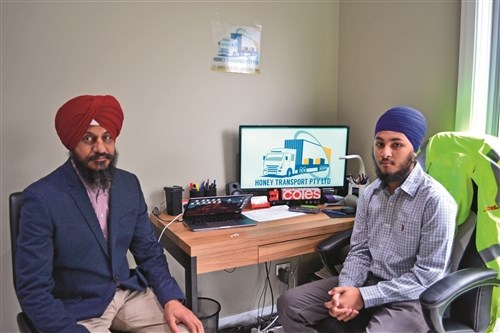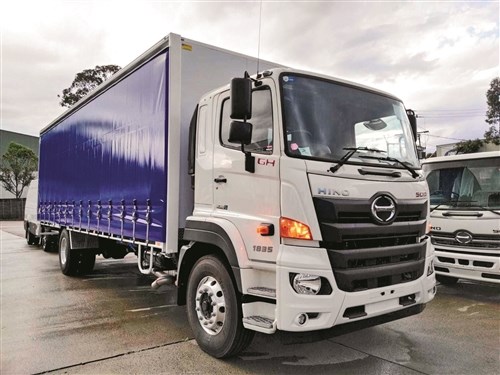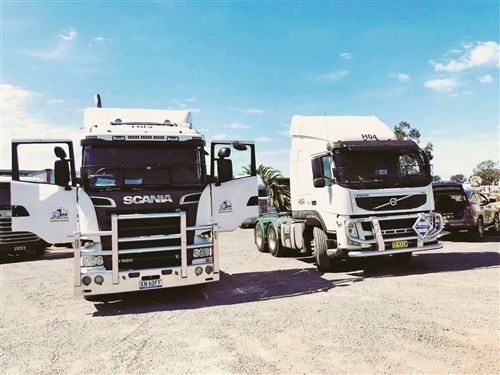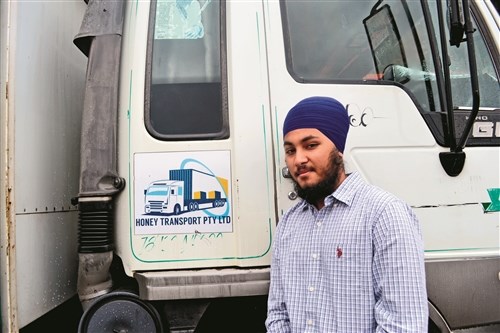How a combination of youth, ambition and community is driving Honey Transport
There’s nothing ordinary about Jaskirt Singh’s situation.
While most 19-year-olds are taking their first steps into employment or further education, he is the national operations manager at Honey Transport, overseeing hundreds of thousands of dollars’ worth of equipment and contracts – with six years’ experience already behind him.
A family business, which started as a single-vehicle operation in Sydney’s west by Jaskirt’s father, Jaspal, in 2012, Honey Transport has grown to a 12-strong fleet with aspirations for further diversification and expansion.
BEGINNINGS
Jaspal migrated to Australia about 25 years ago, working various roles in manufacturing and security before moving to truck driving over a decade ago.
He operated an eight-tonne, 1997 Hino GH for DSE Transport over a couple of years, which eventually became Honey Transport’s first truck.
“The owner really liked dad. So he said: ‘If you want to purchase the truck, you can.’ And so dad acquired that truck and kept subcontracting for DSE,” Jaskirt explains on a rare rainy day in the state.
One became two when a cousin acquired a truck and joined the team, and then a third rigid was put to work with Direct Couriers – but eventually also joined the DSE staple due to timing clashes.
That’s when Jaskirt joined the team, gradually building up his knowledge of trucks and the business from the passenger’s seat before being thrown in the deep end.
“Dad wanted me to take care of all the finance and operations because his English was not that great – so he wanted me to communicate and get more contracts.” Piece of cake.
It’s been a learning curve, one that Jaskirt has relished but openly admits has also come with its difficulties – from the quirky to the costly.
“I was probably 12 years old, helping with a delivery, and the customer expects me and dad to take a 30–40kg wardrobe up the stairs into her apartment.
“And then she starts yelling at us and says we damaged her stuff and we’re like: ‘We can’t really do much more. I’m 12 years old, you can’t expect me to do that.’
“The other big issue for many people that enter the industry is having that monetary relationship where they don’t know what rates they’re getting, if they’re receiving enough money, and how they’re going to get paid – on time or at all. I’ve probably lost $6,000–$7,000 in companies not paying well.
“But slowly from mistakes you learn. Now, before we start with a company, we build a relationship, we’ve implemented credit application forms.
“That’s the kind of stuff I’ve learned probably since Year Seven.”
Naturally, the next line of inquiry is how he managed all that while juggling high school.
“It was a struggle. I had to manage time really well because you never know when the business could flop.
“I’d probably go from 8am to 3pm at school, come home, study for a couple of hours and then also have to do payments and other admin at night probably until midnight – and then go to sleep and then wake up in the morning.
“I used to get phone calls during school, and I’d have to say I have to go to the toilet or something, make up an excuse and then quickly pick up the call.”
MATURITY
When Honey secured a contract with ABS Transport, it led to the acquisition of another 12-tonne truck and a first prime mover.
The expansion process continued when the company began procuring its own contracts and, last year, putting together a complete business plan.
“We’re doing a step-by-step process to expand our business,” Jaskirt explains.
“We’re trying to expand to more interstate and container work, and becoming a more logistics-based company in the way of doing 3PL work.”
With a 10-year vision comprising opening its own warehouse and expanding to service bigger clients, Honey’s current focus is ramping up its sales and marketing expertise.
“I’m in a position where I have to find my own clients – that’s why we’ve got a position for a sales rep, trying to find someone who’s more experienced in the industry regarding sales and earning contracts.”
The fleet currently sits at a dozen, ranging from eight-tonne tautliners to B-double prime movers, and another eight trucks through its subcontractor network.
A recent milestone was partnering with local Hino dealer, City Hino.
“Last year, we stopped purchasing second-hand vehicles,” Jaskirt says.
“We’ve aimed on reducing downtime on breakdowns because, once you get many trucks, it’s hard for one person to go out when one breaks down.”
Alongside Hino, the family prefers Isuzus for its rigid work.
“They’re the best for aftersales service, and it’s less of a headache selling it – Isuzus sell very fast when you put it on the market. Hino as well.”
“For prime movers, we have a Scania and Volvo but I prefer the latter for prime movers because it’s easier to get service done.”
Echoing the general trend of industry, especially with Chain of Responsibility (COR) changes, there’s an emphasis not just on newer equipment but technology as well.
The business often receives offers from potential providers of top-of-the-range payroll or fatigue-management systems.
“Because they’ve seen the COR come out now, it’s really changed conceptions or how businesses are acquiring transport partners – they don’t want someone who can just give a cheap rate, they want service. Last year we got GPS tracking in our trucks.”
That advantage brings with it a hurdle, Jaskirt notes.
“Tech is good. It’s going to change the industry and bring a new level of service.
“However, tech companies’ rates are really high.
“And then clients expect you to have top-of-the-class drivers, vehicles, training and everything. They want you to spend, say, $10,000 on a truck for the same rates of pay.
“There isn’t a price floor in transport and that’s why some businesses can’t expand their services, or even go into losses: because there’s so much expectation on a business, yet they’re not receiving sufficient income to provide that level of service.”
COMMUNITY
Most of Jaskirt’s extended family is involved in transport in some capacity.
“It’s something that’s been in our blood, you could say,” he admits.
“My cousins all drive trucks.
“My granddad, even in India, he used to have three, four trucks, and he was part of the union – he had a big position there.
“Now that he’s here, if we have an issue with a truck, he can tell what the problem is and we get it fixed.
“Even if you go to America, Canada … Indians love trucking. Most of the Indians you ask, they’ll either drive a truck or drive a taxi.”
With a strong work ethic comes an even stronger sense of solidarity. Honey Transport is well known – and heavily involved in – the community and various initiatives.
“Many people in our Indian community, when we say Honey Transport, they’re like, ‘Oh yeah, Honey, Honey.’ Everyone knows Honey.
“So what we have is these WhatsApp chats. There are probably 300 people per chat and when someone needs a job, or someone needs help with something, we try and help each other out.
“We’re very interconnected. Our whole family loves helping out the community because lots of people helped dad get to where he is now; people giving him advice on how to buy a truck, that kind of stuff.”
One of Honey’s recent projects was helping out with the logistics for the Sikh Heritage Day.
“The last couple of years it’s been happening, dad and I help out with setting it up and everything. If they need any trucks, we’ll send a truck over and help out,” Jaskirt says.
“We donate money to a school that’s getting built just down the road. They’re projecting to probably start next year. That’s the first ever Sikh school going to be built in Australia.
“[We help] the Australian community as well – free food, that kind of stuff.
“We go to universities, recently giving around probably 2,200 boxes of food, and then we’re going in the city as well later next month.”
RACE AND RACISM
Sadly, the Singh family isn’t always accepted with open arms, a symptom of an industry desperately lacking in diversity and, often, open-mindedness.
Jaskirt is candid in his assessment of race and prejudice in transport.
“More Indians are coming into the industry.
“Because of jobs shortages and how the taxi industry is going because of Uber, many of them are switching over to trucks and they don’t have much background knowledge. So they’re maybe accepting cheaper rates than they should be.
“What we’re seeing in the industry is many Indian people, with or without turbans, even if they’re not openly discriminated against, there’s some tension.
“Whenever I’ve been with dad, he’s never had an issue. But if you turn on the walkie talkie, sometimes an Aussie driver will go by and, while I’m friendly to them, sometimes they start swearing at you.
“We’ve had issues with forklift drivers going off at our drivers.
“What I tell my drivers is: if someone starts swearing at you, you reply politely to them.
“When they slap you and you hug them back, it’s that weird sense of, ‘hold on a second, what am I doing to them?’”
As the saying goes, you do catch more flies with honey than vinegar.
“I think in a way it’s sort of improving. Lots of people love the last name Singh: ‘Oh, hey, Mr Singh’, they’ll say.”
APTITUDE
Jaskirt notes he currently has an MR license, but it’s not the driving or mechanical side of the company that interests him.
Rather, it’s the business element, which is why he’s studying a degree in business administration – something else to add to his plate.
“In the yard, I can operate a truck here and there and next February I can get a prime mover licence. But it’s not really much of my thing.
“Definitely though you’ve got to help out.
“Sometimes when a driver calls in sick at four o’clock in the morning, dad has to get ready by six. It’s a dedication to your business.”
That may make it a 24-hour-a-day commitment, but it’s one Jaskirt wouldn’t give up for the world.
“Not going to lie – I love doing the job.
“Some people are just in it for the money, but the thing is I love working in the industry.
“There are lots of friendly people – we just joke around on the day with the drivers.
“I love when companies send you through jobs – I feel like I’m managing a big business. I love that.
“My parents say, ‘Don’t put so much stress on yourself.’ But I love the rush.”
WHAT’S IN A NAME
Despite Jaskirt’s key role in the company, Honey Transport is actually named after – and is a play of words on – his younger brother, Haneep. He is also taking his first steps intothe company, juggling that with high school.
It was a nickname that formed over time and, well, stuck, Jaskirt explains.
“Honey Transport … that’s a long story. It was a big fight between us,” he says. “My dad, because he didn’t have much knowledge on how to apply for a business, got a call asking the name he wanted to choose. He’s just sitting there and he goes, ‘Honey’.
“I was upset about it. Hold on a sec, you’re choosing my brother’s name. That’s not fair. Maybe H&J or something like that, make it even.
“But then after a while, that name sticks more – like honey.”



.jpg)



.jpg)
